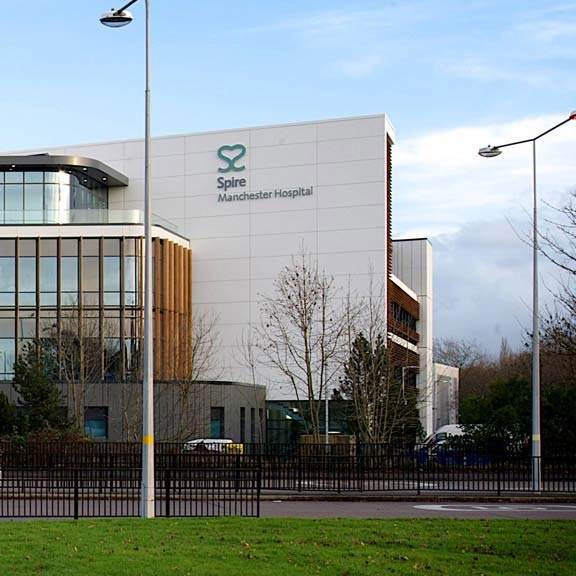Transcatheter Aortic Valve Insertion (TAVI)
We offer a less invasive heart valve replacement procedure to treat aortic stenosis (a narrowed heart valve) for patients who aren't suitable for open heart surgery.
Sometimes also called
- Aortic valve replacement
At a glance
-
Typical hospital stay
2 nights -
Procedure duration
2-3 hours -
Type of anaesthetic
General or sometimes local -
Available to self-pay?
Yes -
Covered by health insurance?
Yes
Why Spire?
- Fast access to treatments, consultations and diagnosis
- Expert, personalised treatments
- Clear, inclusive pricing
What is Transcatheter Aortic Valve Insertion (TAVI) surgery?
As you age, your heart (aortic) valve can become narrowed and stiff due to a build up of calcium. This condition is called aortic stenosis. It can restrict the flow of blood from the heart making your heart work harder to pump blood to the rest of your body.
As the left ventricle has to work harder it gradually gets bigger (ventricular hypertrophy) and the heart muscle works less efficiently.
Symptoms of aortic stenosis may include:
- breathlessness through exertion but also when at rest
- chest pain on exertion (angina)
- dizziness
- swollen ankles
- collapse or fainting
Left untreated, severe aortic stenosis can lead to heart failure.
When is heart valve replacement surgery recommended?
If you have an aortic valve disease and you have no or only mild symptoms, you may just need to be monitored to check whether the condition is getting worse.
If your symptoms do get worse over time, you may need to have heart valve replacement surgery.
Find your nearest hospital
We have dedicated heart specialists offering the TAVI procedure for treating aortic stenosis (a narrowed heart valve).

How does TAVI work?
Some patients cannot have open heart surgery or are deemed high risk due to their age or other conditions.
TAVI (Transcatheter Aortic Valve Insertion) is a non-surgical alternative to open heart surgery that is used to replace a narrowed heart valve and relieve the symptoms of aortic stenosis.
A catheter (thin flexible tube) containing a replacement valve is inserted through a small cut in your groin, chest or top part of your shoulder. You'll be given a local anaesthetic to the area where the catheter will be inserted.
The catheter is changed for the delivery catheter for the valve; it is positioned within the opening of the aortic valve.
The catheter is guided through an artery to your heart using special imaging equipment and the replacement valve is fitted over the damaged aortic valve. The new valve is placed in position; it either expands by itself or is expanded using a balloon, depending on which type of valve is used. The balloon is deflated before the balloon and catheter are removed. The new valve now sits inside your own valve.
TAVI is carried out in a hybrid theatre - an operating theatre with advanced imaging equipment - and normally takes one to two hours to complete.
TAVI is a technically challenging procedure and is usually performed by a multidisciplinary team consisting of:
- an interventional cardiologist
- a cardiac surgeon
- a team of specialist nurses
- cardiac physiologists
- radiographers
TAVI procedure: what to expect
Preparing for TAVI surgery – diagnostic tests
As TAVI is a complex procedure you'll have several diagnostic tests before surgery to ensure it’s the right procedure for you.
- A CT scan of your heart and your arteries all the way to your groin. A contrast dye may be injected into a vein in your arm. This contrast dye highlights your blood vessels and creates clearer pictures so we can see your arteries and plan the best treatment for you
- An angiogram to make sure your coronary arteries are clear and they are not the cause of your symptoms
- An echocardiogram scan of your heart
These tests are usually done on different days as you'll need to have one test with the contrast dye.
Your cardiologists will discuss your case and your test results with all the consultants involved.
How long does TAVI surgery take?
The TAVI procedure normally takes one to two hours to complete.
During TAVI surgery
Anaesthetic choices
The majority of TAVI procedures are done while the patient is awake. You'll be given a local anaesthetic to the access area used.
An anaesthetist will make sure you are comfortable and they will sit near you so you can talk to them if you need to.
Pain after TAVI surgery
Your groin may be uncomfortable and your anaesthetist will have prescribed painkillers for you.
Your hospital stay
You'll go from the hybrid theatre to a high dependency unit (HDU) where expert staff will monitor you for around 24 hours. You'll be moved to your own private room on the following day. You'll be able to get out of bed and walk around the day after your procedure. Most patients stay in hospital for 24-48 hours.
Q & A
Dr Mark Turner, Consultant Cardiologist
Dr Mark Turner, a Consultant Cardiologist, says the treatment options for severe aortic stenosis are between traditional open heart surgery and transcatheter aortic valve implantation (TAVI). Dr Turner explains that TAVI has a much lower risk, quicker recovery and less postoperative pain – especially for elderly patients.
Your recovery: what to expect
Pain relief
Your anaesthetist will prescribe painkillers for the first few days. Suffering from pain could slow down your recovery, so please discuss any discomfort you have with your doctors or nurses. Your chest area will be sore and bruised so we'll provide you with a supply of all the medicines your consultant feels you need to take home with you after you've left hospital, up to 14 days. This may be at an additional cost to some patients.
You'll be advised on the steps you should take to aid your recovery before you leave the hospital but everyone recovers from this sort of operation at a different speed.
A physiotherapist will see you each day during your hospital stay. They will run through some gentle exercises to help maintain your circulation and will offer support and advice to help get you back on your feet.
Before you leave the hospital, your consultant may give you a thorough checkup and repeat some of the tests that you had before your operation, such as the echocardiogram.
A letter will be sent to your GP, but you should also make sure that your GP knows that you are returning home after having this operation.
At your follow-up appointment, your consultant will give you advice about resuming your other normal activities, including returning to work, if applicable. A full recovery can take two to three months.
After your operation we'll provide you with all the appropriate medication, lifestyle advice and any other follow-up support you need. You'll be given a contact telephone number for the hospital and a follow-up appointment with your consultant. This is usually about six weeks later.
Risks and complications
All surgery carries risks and your consultant will explain them to you before you go ahead.
Complications may require further treatment, such as:
- Returning to theatre to stop bleeding
- Antibiotics to deal with an infection
Rarely, 10% of patients may need a pacemaker as the new valve may affect the natural conduction system in your heart
The treatment described on this page may be adapted to meet your individual needs, so it's important to follow your healthcare professional's advice and raise any questions that you may have with them.
Get in touch
Sources
https://www.bhf.org.uk/informationsupport/treatments/tavi
https://www.mayoclinic.org/diseases-conditions/aortic-stenosis/symptoms-causes/syc-20353139
https://www.spirehealthcare.com/conditions/heart-valve-disease/
https://www.nhs.uk/conditions/aortic-valve-replacement/whyitsdone/
https://www.nice.org.uk/guidance/ipg586 - NICE guidance on Transcatheter aortic valve implantation for aortic stenosis
https://www.nhlbi.nih.gov/health/heart-tests - CT scan with contrast

